Crisis management: Plan in advance
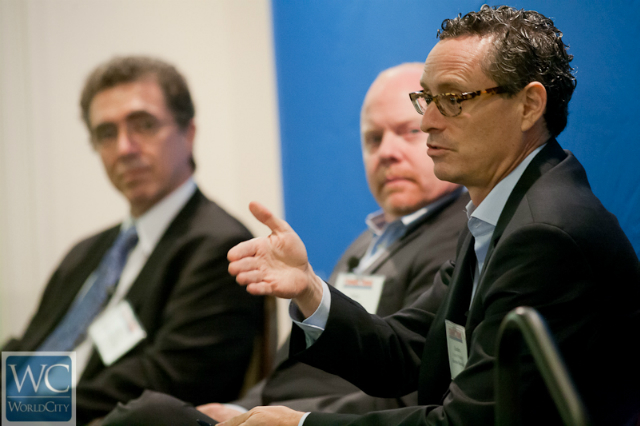
The best way to handle a crisis in your business is to prepare for it in advance.
It’s easier than you think. If you’re in the creative field, you know what the threats are, such as patent infringement. Or if you are in logistics, you know that bad weather, a workers’ strike or street protests can thwart delivery. You can develop systems and have them ready in case of an emergency.
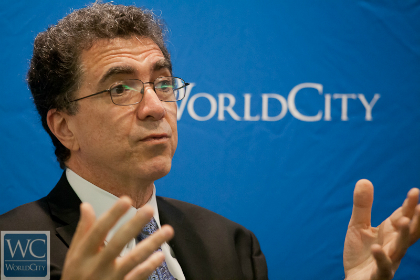
Jorge Espinosa, founding member of law firm Espinosa Trueba. Photos by Carlos Miller
That was the advice offered at WorldCity’s Global Connections on Feb. 28, when panelists from communications, security and legal backgrounds shared their expertise on crisis management.
“You have to have consistency, and you have to have education,” said panelist Jorge Espinosa, founding member of law firm Espinosa Trueba, which specializes in intellectual property including patents, trademarks and copyrights. “If you have to wait until a crisis, it’s too late.”
Social media demands faster responses
In communications, social media has changed the game, said panelist Ramiro Prudencio, president and chief executive for Latin America public relations and communications giant Burson-Marsteller, who is pictured in the top photo.
Companies with problems can expect immediate coverage on Facebook, Twitter and other social networks, unlike years back when TV and traditional media took longer to report on events.
That means companies also have a chance to get their message out in real-time, if they have a communications system and strategy in place to be able to respond quickly when crisis hits, he said.
“About 80 percent of crises are absolutely predictable,” said Prudencio, referring to such incidents as a food or drug product that goes bad, an accident at the workplace, a fire, hurricane or other typical woes.
“Make sure you’ve run those scenarios in advance,” involving top executives, legal advisers and others, he said. “If those conversations haven’t happened ahead of time, you will be behind the curve.”
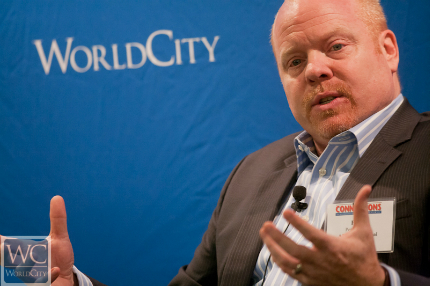
Peter Martin, chief executive of AFIMAC Global
To reduce security risks for executives or high-level groups visiting risky or crowded places, preparations involve more mundane issues than potential kidnappings. Security teams must consider more likely woes such as language issues and logistics, if someone’s allergies kick in or they get sick from new foods.
Key questions to consider include: How do we know where people are? What if they don’t arrive on time? Which hospitals should they be taken to? And if needed, how do we evacuate them?, said panelist Peter Martin, chief executive of AFIMAC Global, which deals with security concerns.
“Granular issues end up being a bigger issue,” Martin told an audience of more than 70 people.
Prepare for “patent trolls” and potential litigation
On the legal front, companies with patents face piracy that can undermine a brand’s reputation, Espinosa said. They also face challenges from “patent trolls,” who claim they represent patents and send letters to companies threatening lawsuits unless you pay up. Many businesses pay to avoid more costly lawsuits.
To deal with “patent trolls,” find out who they are. If you know of others who received letters, form a group and fight them together. And develop policies to communicate to customers that there will be business continuity, even in the event of a lawsuit, panelists said.
Audience members had plenty of questions.
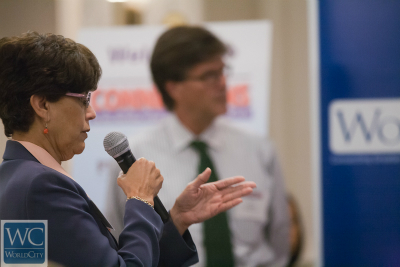
Francia Guzman of Visa
During a crisis, how should companies deal with their own employees?, asked attendee Francia Guzman, a veteran human resources executive who long worked with financial services giant Visa. Employees can speak out on social media giving a “thumbs up” or “thumbs down” on their employer.
Companies should have social media policies, said Prudencio. If you’ve done that work in advance and build a positive culture, then employees can help the company and the brand during a crisis, he said.
Your photo in the bathroom posted online?
How can executives protect themselves in today’s social media age, when even in the bathroom, someone can snap a picture of you on their phone and post it online?, asked Liane Ventura, senior vice president at the Greater Miami Chamber of Commerce.
It’s vital to teach executives how to act in public and be aware of their surroundings: “You are always one bad incident from being on the front page of the social media landscape,” warned Martin.
What are some best practices to approach crisis management planning?, asked John Price, managing director in Miami for Americas Marketing Intelligence.
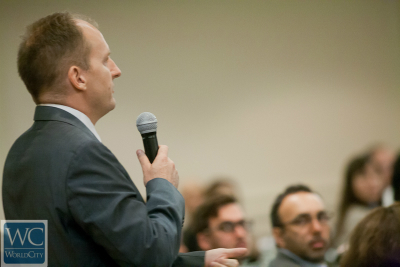
John Price, managing director in Miami for Americas Marketing Intelligence
When analyzing scenarios, look at their possible likelihood and their potential impact on the business and its reputation. Focus first on ways to address those scenarios that are most likely and that hurt most, said Prudencio.
It also helps to set a schedule to review scenarios, perhaps once a year. Make sure there is participation and buy-in from top management. And ask company staff: What have we missed? Are there small incidents that have occurred that signal something bigger could happen?, panelists added.
A business culture open to discussing problems lends itself more to addressing those woes early. In contrast, cultures that “shoot the messenger” tend to miss signals and face bigger problems later.
Localize crisis management plans
Some multinationals have solid crisis management plans, but those plans are developed in their home markets and not adapted to other markets where they operate, such as South America, said Ruben Mena, president for Latin America at AFIMAC Global. How do you encourage them to customize plans?
“Local management needs to embrace this,” said Prudencio, “and it needs to be tailored.”
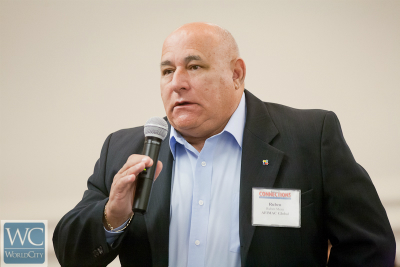
Ruben Mena, president for Latin America at AFIMAC Global.
Global Connections is one of six event series hosted by media company WorldCity to bring together executives on international topics. The Global series is sponsored by air-conditioning systems maker Daikin, Florida International University Business, public relations firm Edelman and real estate company Waterford at Blue Lagoon.
The next Global Communications session is set for March 25 at 8 a.m. at the Four Seasons Hotel in downtown Miami on “State of Trust in Latin America.” The session will discuss results from Edelman’s annual Trust Barometer survey that looks at trust in government, academia, media and business.